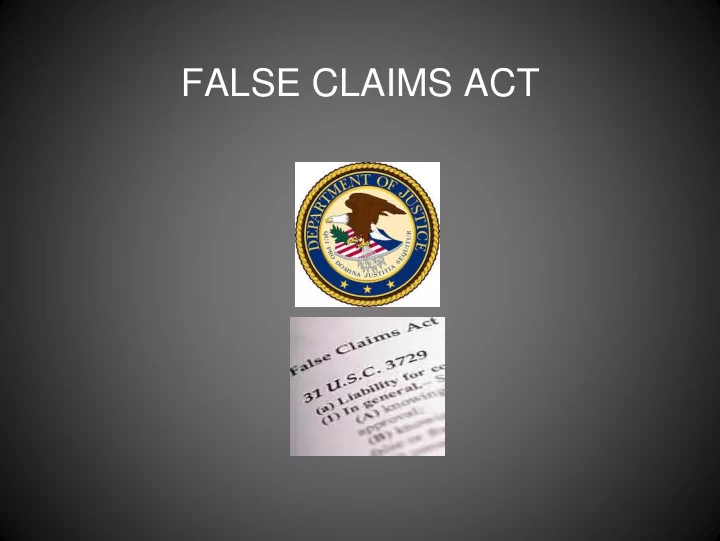

FALSE CLAIMS ACT
OVERVIEW • Enacted during the Civil War in 1863 • To fight procurement contract corruption • To redress fraud involving federal government programs • Prohibits false claims involving U.S. Monies
False Claims Act 31 U.S.C., Section3729, et seq. • Whoever KNOWINGLY: • Presents or CAUSES to be presented a fraudulent claim for money or property against the United States • Makes or CAUSES to be made a false statement in order to induce the United States to pay or approve a claim • Conspires to defraud the government by attempting to get a false claim paid • Makes or CAUSES to be made or uses a false statement to avoid or to decrease an obligation with the Government
ELEMENT OF KNOWLEDGE UNDER THE FALSE CLAIMS ACT • Actual knowledge of the False Claim
ELEMENT OF KNOWLEDGE UNDER THE FALSE CLAIMS ACT • Deliberate ignorance of the truth or falsity • Reckless disregard of the truth or falsity • But see K & R Partnership v. Massachusetts Housing , 2008 WL 2651088 (D.C. Cir. 2008) (holding that reliance on a reasonable interpretation of an ambiguous requirement in FCA cases precludes the finding of "reckless disregard" under 31 U.S.C. § 3729(b)(3))
INTENT UNDER THE FALSE CLAIMS ACT • NO SPECIFIC INTENT REQUIRED • United States v. Cabrera-Diaz , 106 F.Supp.2d 234, 239 (D.P.R. 2000)(no proof of specific intent is required) • United States ex rel. Hagood v. Sonoma County Water Agency, 929 F.2d 1416, 1421 (9th Cir.1991 ) (“what constitutes the offense is not intent to deceive but knowingly presentation of a claim that is either ‘fraudulent’ or simply ‘false’ ”) • United States v. DiBona, 614 F.Supp. 40, 44 (E.D.Pa.1984) An employer will not be able to escape liability by proving its ignorance of an employee's false statement. The employee's knowledge that a claim is false will be imputed to his or her employer.
QUI TAM PROVISIONS UNDER THE FALSE CLAIMS ACT 31 USC 3730 A.K.A. WISTLEBLOWER
QUI TAM PROVISIONS UNDER THE FALSE CLAIMS ACT • Any citizen can present a FCA complaint on behalf of the United States • Complaint is filed under seal • The United States will have 60 days to decide whether to intervene, however, for good cause shown, extensions could be granted. • If the United States intervenes, Relator’s share is 15% to 25% • If the United States declines to intervene Relator’s Share is 25% to 35%
QUI TAM PROVISIONS UNDER THE FALSE CLAIMS ACT • LARGEST FCA SETTLEMENT IN HISTORY ($2 BILLION) • RELATOR’S SHARE WAS $96 MILLION DOLLARS
False Claims Act 31 U.S.C., Section3729, et seq. • STATUTE OF LIMITATIONS: • 6 Years from the date of payment of the claim; or • 3 years from the date the fraud was discovered by an official with authority to take action; • But in no event, more than 10 years after the submission of the claim.
PENALTY • Treble Damages - “ Mandatory pursuant to 31 U.S.C., 3729(a)(2) • Civil Penalties $10,781.00 to $21,563.00 per claim - The United States is entitled to recover [civil penalties] solely upon proof that the false claims were made, without proof of any damages.” S.Rep. No. 345, 99 th Cong., 2d Sess. 8 (1986) . • No actual damages are required; you can seek only penalties • Debarment or exclusion • Parallel Criminal Proceeding
ADVANTAGES OF FCA • Lower burden of proof (Preponderance) Preponderance Beyond Reasonable Doubt VS.
ADVANTAGES OF FCA • NO RIGHT AGAINST SELF INCRIMINATION • Unless a parallel criminal investigation is pending or reasonably foreseeable
WHO IS SUBJECT TO SUIT • Individuals • Corporations: a. Under Respondent Superior or b. Apparent authority • Municipal Corporations • Municipalities • State Agencies
INVESTIGATION OF FCA CASE • Initial Referral to Law Enforcement: Individual, auditors, agencies, etc. • OIG does initial assessment and contacts USAO • Civil and/or Criminal sections open case • Agent gathers internal documents already on Government’s possession
CONT. INVESTIGATION OF FCA CASE • Agent does initial assessment of existence of a false claim, loss, possible witnesses and evidence needed • Agent and AUSA conducts interviews and determines if subpoenas are needed • Target Letter or letter of intent is issued to potential defendant before commencing action in court • Parties engage in discussions toward settlement • Case is filed in Court • Trial
WHO IS THE GOVERNMENT • Federal Agencies • Federal Corporations • Entities dealing with Federal Monies: Claims to Gov. contractors, subcontractors to prime contractors and fiscal intermediaries (CMS, etc…)
WHO IS THE GOVERNMENT • Government insured loans • Non-Appropriated Funds • Foreign Military Sales • Claims made to grantees of federal monies
APPROPRIATE CASES • Any case in which there is a false representation or claim • False billings to Medicare • Overbilling cases (any payments which after reconciliation the person was not entitled to) • Any overpayment not returned after the deadline to return • Procurement fraud • GRANT FRAUD (DEPARTMENT PRIORITY)
WHAT TO LOOK FOR • Patterns of billing (as in any criminal case) • Identified overpayments • Billings submitted • Look into Medicare regulations and Enrollment Applications • Regulations and rules pertaining to any grant moneys • Grant moneys used for non-authorized or intended uses.
RECOVERIES SINCE 1986 • From 1986 to 2013 the Government has recovered over $35 billion dollars in False Claims Act Cases • Of the $35 billion in recoveries, $24 billion were recovered by HHS.
QUESTIONS?
Recommend
More recommend